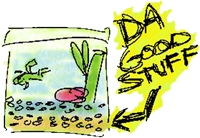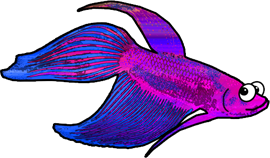
 Over the years we have fielded thousands of questions, the following are the most common questions we get...
Over the years we have fielded thousands of questions, the following are the most common questions we get...
The EcoAquarium® looks very small. Do Betta Fish & African Dwarf Frogs need more space to live?
No, the natural environments of these animals are pretty much the same, small, shallow pools of stagnant swamp water. The EcoAquarium® is a good and clean environment - even better...there’s no predators.
My friend has a 5-gallon tank. He has a heater and a filter, do I need these for my EcoAquarium®?
No, this is not required for this size aquarium; however, they do need to be kept in a room with temperatures between 68 and 84 degrees, or 20 to 29C.
I am concerned that the frogs will not be properly cared for by children. Do the frogs need a high amount of monitoring and maintenance?
No, that is what makes them excellent first pets for children. They are very low maintenance and only need to be fed twice per week and have their water changed every three months by an adult. They are also hearty enough to miss a feeding or two without ill effects.
My frog died. He had a big round spot on his chest, – what is it?
There is no way to know exactly what this spot is unless you take the frog to a veterinarian, who could get a biopsy sample to send to a pathologist. A skin lesion could have a number of causes, including bacterial infection, viral infection, fungal infection, parasite infestation, dermatitis, pigmentation, or a tumor of some kind.
Is it really OK to only change the water every 3 to 6 months?
Yes, the brown living gravel in your EcoAquarium® is infused with healthy living bacteria that feed on the waste from the frogs and the excess food in the tank, therefore cleaning the water continuously. For both Betta Fish & African Dwarf Frogs, they both evolved living in shallow, stagnant swamp water with far worse water conditions.
Why do you need use spring water instead of tap water?
 Most tap water has been treated with chlorine and other chemicals to remove harmful bacteria from the water to protect us from water borne illness. Unfortunately, those same chemicals will also kill the healthy bacteria that make up the living gravel in your EcoAquarium® and can also be harmful to plants & animal life subjected to living in it all the time.
Most tap water has been treated with chlorine and other chemicals to remove harmful bacteria from the water to protect us from water borne illness. Unfortunately, those same chemicals will also kill the healthy bacteria that make up the living gravel in your EcoAquarium® and can also be harmful to plants & animal life subjected to living in it all the time.
Why do frogs shed their skin and what do we do with the skin? Is there a shedding “season”?
The African Dwarf Frog does not produce skin oil or a slime coat. Consequently they need water to keep themselves hydrated. The frogs shed their skin every 1-2 weeks as they grow, and will usually eat the skin. If you see it in the tank you can remove it. There is no “season” for shedding.
My frog has laid eggs! What do I do?
First be aware that it is very difficult to raise frogs from the eggs and should you decide to attempt to do so, please understand these eggs are not likely to be fertile. If you find eggs in your tank, chances are the frogs will eat them. If they aren’t you should remove them either with a net or turkey baster.
Sometimes my frogs “fight”. It looks like they are play wrestling but sometimes it looks serious. Are they hurting each other? What should I do?
Frogs will sometimes “fight”. They can’t really hurt each other, but you can see nipping and tugging at each other. This behavior is more common when there is a female frog in the tank or when they are being fed. During feeding they may grab at each other, not to fight but by mistake due to poor vision.
 Isn't my Betta Fish lonely all by itself in the tank?
Isn't my Betta Fish lonely all by itself in the tank?
Not at all. The Betta's we offer are all long-finned males, the peacocks of the Betta Fish world. Betta's are VERY territorial and very aggressive around other males. They will flare their fins and attempt to fight at the sight of another male Betta. Put two together, they will immediately fight. It's one reason they became a popular fish species. Originally, people would raise them to fight them. Instead, it's better to keep them in their own habitat, a King in his own domain.
This is common to African Dwarf frogs, we don’t know why they do it, but we call it the “Zen” state or pose. It may possibly be an instinctive trait of "still-stalking" to ambush prey, or staying motionless to avoid attracting predators.
Sometimes when I feed my frogs, one frog eats all the food! I am worried that the one frog is not eating enough. What should I do?
Adding a couple more pellets at regular feeding is likely to be more effective – working on the ‘predator satiation’ principle, the larger frog can only eat until it’s full, leaving the rest for the other frog. Feeding more often means the larger frog has more opportunities to outcompete the smaller one.
My frog is always hiding behind a rock or a bamboo. Why is this?
African Dwarf frogs in their natural habitat are at the bottom of the food chain and are prey to birds, fish and mammals. Therefore it is natural for them to want to hide.
How long will my frogs live?
The average life span of the African Dwarf frog is 2-4 years, with many living well past that.
How do I know if my frogs have salmonella?
There is no way for the frog owner to know if their frog is carrying the salmonella bacteria. But local health officials test all Funology frogs before being shipped. They also have extensive bio-security measures at their facility to assure that the frogs are handled properly. African Dwarf Frogs should be treated as any other amphibian or household pet. Precautions should always be taken, especially around very young children or the aged or with people with compromised immune systems. Washing hands is essential for protecting your family, as well as the frogs, as their immune system is as susceptible to new environments as ours.
How can I tell if my frogs are happy and comfortable? Is this a good environment for frogs?
If your frogs are active and aware of their surroundings and come swimming to greet you at feeding time you can be sure they are happy,









